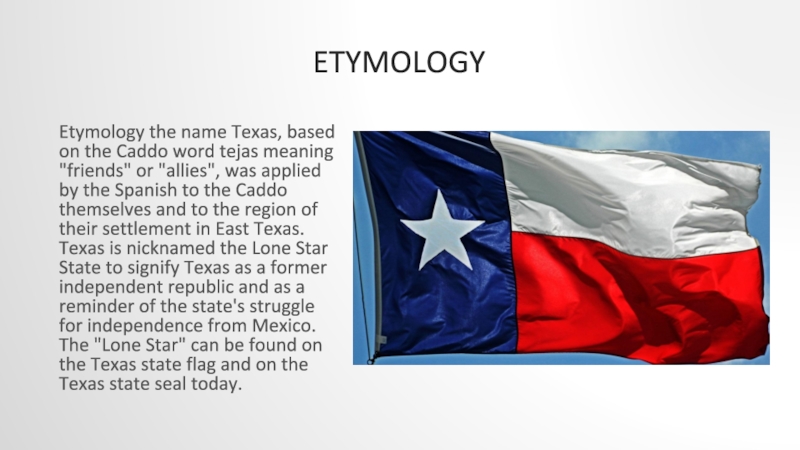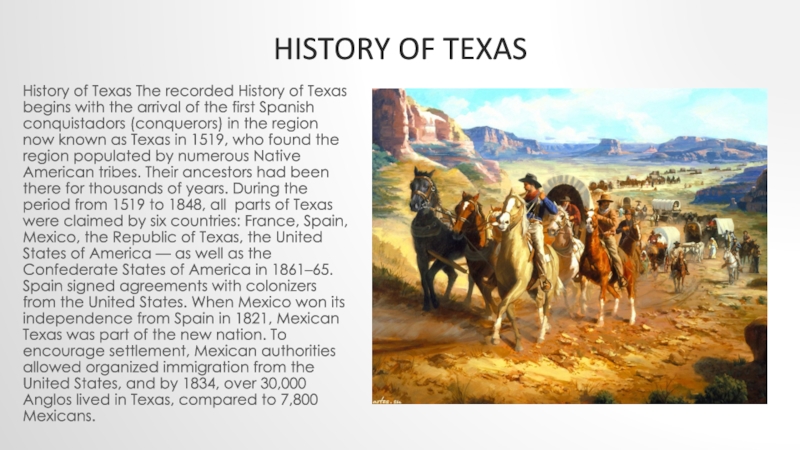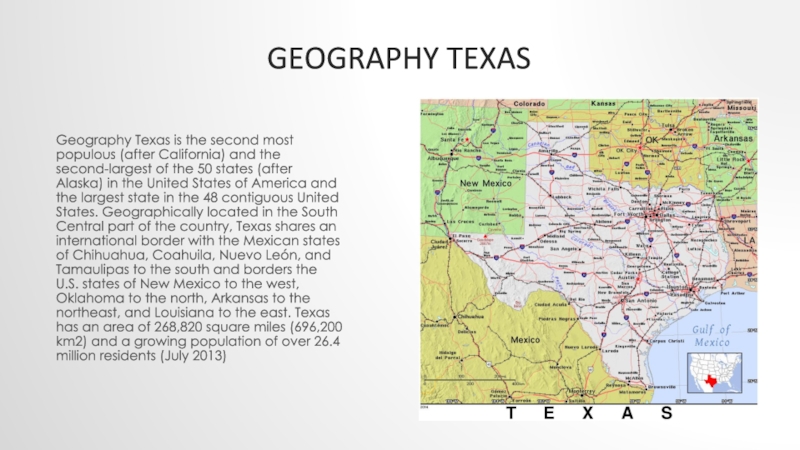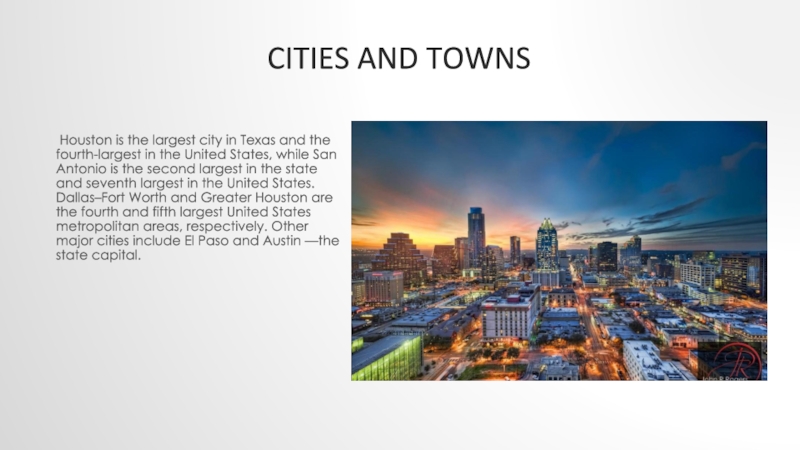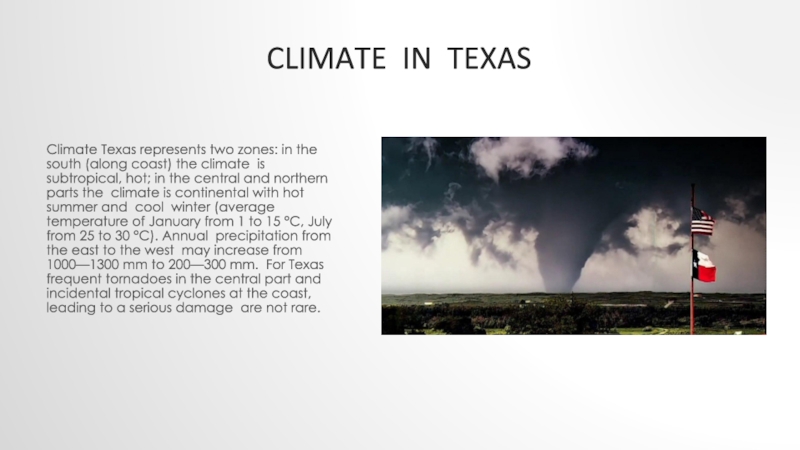- Главная
- Разное
- Образование
- Спорт
- Естествознание
- Природоведение
- Религиоведение
- Французский язык
- Черчение
- Английский язык
- Астрономия
- Алгебра
- Биология
- География
- Геометрия
- Детские презентации
- Информатика
- История
- Литература
- Математика
- Музыка
- МХК
- Немецкий язык
- ОБЖ
- Обществознание
- Окружающий мир
- Педагогика
- Русский язык
- Технология
- Физика
- Философия
- Химия
- Шаблоны, фоны, картинки для презентаций
- Экология
- Экономика
Презентация, доклад по английскому языку на тему Техас (6 класс)
Содержание
- 1. Презентация по английскому языку на тему Техас (6 класс)
- 2. EtymologyEtymology the name Texas, based on the
- 3. History of TexasHistory of Texas The recorded
- 4. First settlement in Texas The first European base was
- 5. Geography TexasGeography Texas is the second most
- 6. Cities and towns Houston is the largest
- 7. Climate in Texas Climate Texas represents two
EtymologyEtymology the name Texas, based on the Caddo word tejas meaning "friends" or "allies", was applied by the Spanish to the Caddo themselves and to the region of their settlement in East Texas. Texas is nicknamed
Слайд 2Etymology
Etymology the name Texas, based on the Caddo word tejas meaning
"friends" or "allies", was applied by the Spanish to the Caddo themselves and to the region of their settlement in East Texas. Texas is nicknamed the Lone Star State to signify Texas as a former independent republic and as a reminder of the state's struggle for independence from Mexico. The "Lone Star" can be found on the Texas state flag and on the Texas state seal today.
Слайд 3History of Texas
History of Texas The recorded History of Texas begins
with the arrival of the first Spanish conquistadors (conquerors) in the region now known as Texas in 1519, who found the region populated by numerous Native American tribes. Their ancestors had been there for thousands of years. During the period from 1519 to 1848, all parts of Texas were claimed by six countries: France, Spain, Mexico, the Republic of Texas, the United States of America — as well as the Confederate States of America in 1861–65. Spain signed agreements with colonizers from the United States. When Mexico won its independence from Spain in 1821, Mexican Texas was part of the new nation. To encourage settlement, Mexican authorities allowed organized immigration from the United States, and by 1834, over 30,000 Anglos lived in Texas, compared to 7,800 Mexicans.
Слайд 4First settlement in Texas
The first European base was established in 1682, when René-Robert
Cavelier, Sieur de La Salle established a French colony, Fort Saint Louis, near Matagorda Bay. The colony was killed off by Native Americans after three years, but Spanish authorities felt pressed to establish settlements to keep their claim to the land. Several missions were established in East Texas; they were abandoned in 1691. Twenty years later, concerned with the French presence in neighboring Louisiana, Spanish authorities again tried to colonize Texas. Over the next 110 years, Spain established numerous villages, presidios, and missions in the province. A small number of Spanish settlers arrived, in addition to missionaries and soldiers.
Слайд 5Geography Texas
Geography Texas is the second most populous (after California) and
the second-largest of the 50 states (after Alaska) in the United States of America and the largest state in the 48 contiguous United States. Geographically located in the South Central part of the country, Texas shares an international border with the Mexican states of Chihuahua, Coahuila, Nuevo León, and Tamaulipas to the south and borders the U.S. states of New Mexico to the west, Oklahoma to the north, Arkansas to the northeast, and Louisiana to the east. Texas has an area of 268,820 square miles (696,200 km2) and a growing population of over 26.4 million residents (July 2013)
Слайд 6Cities and towns
Houston is the largest city in Texas and
the fourth-largest in the United States, while San Antonio is the second largest in the state and seventh largest in the United States. Dallas–Fort Worth and Greater Houston are the fourth and fifth largest United States metropolitan areas, respectively. Other major cities include El Paso and Austin —the state capital.
Слайд 7Climate in Texas
Climate Texas represents two zones: in the south
(along coast) the climate is subtropical, hot; in the central and northern parts the climate is continental with hot summer and cool winter (average temperature of January from 1 to 15 °C, July from 25 to 30 °C). Annual precipitation from the east to the west may increase from 1000—1300 mm to 200—300 mm. For Texas frequent tornadoes in the central part and incidental tropical cyclones at the coast, leading to a serious damage are not rare.

